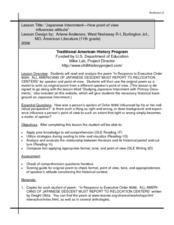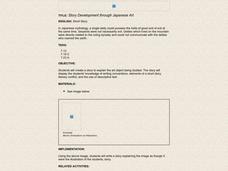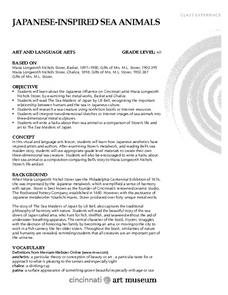Curated OER
Japanese Internment--How Point of View Influences Attitude
How does background and experience influence one's point of view? Dwight Okita's famous poem about the Japanese internment is the text used to explore this essential question. Class members study primary documents to gain the necessary...
NPR
Civil Rights of Japanese-American Internees
Prompted by a viewing of Emiko and Chizu Omori’s Rabbit in the Moon, a documentary about the internment of Japanese-Americans during World War II, high schoolers examine a series of documents, including the Bill of Rights and the UN’s...
Curated OER
Japanese Poetry: Tanka? You're Welcome!
Students explore tanka, a form of Japanese poetry. They read and analyze tankas to determine the structure and intent, and compose a traditional and a non-traditional tanka.
Curated OER
Coming of Age During Japanese Occupation: Richard E. Kim's Lost Names: Scenes from a Korean Boyhood
Explore the implications of the Japanese occupation of Korea during World War II. Learners read Lost Names: Scenes from a Korean Boyhood, participate in classroom discussions about the novel and keep journals in which they respond to...
Curated OER
Story Development through Japanese art
A classic Japanese print is attached to this lesson and its up to your class to write a story about it. Pretending the image is an illustration, they use what they know about Japanese mythology to compose a short story describing the...
Curated OER
The War: Japanese Americans and Internment
Students examine the experiences of Japanese-Americans at the beginning of World War II in America. After watching an excerpt from "The War", they answer reflection questions about the Japanese being put into internment camps. In groups,...
Curated OER
Say Hi to Haibun Fun
What is a haibun? With this interesting lesson, writers will experience the Japanese writing form haibun, identify elements important to Japanese writing styles, analyze a haibun, and compose their own. Different from the typical journal...
Curated OER
Creating Scrolls Based on the Illustrated Tale of Genji
Now these are learning activities full of fun, art, and cultural exploration. Kids consider the art of storytelling through comic book images. They then look at the Tale of Genji as it was written in the 11th century. They discuss...
Curated OER
Letters from the Japanese American Internment
Students explore the concept of Japanese internment. In this Japanese internment lesson, students examine primary sources that enable them to discover what internment camp life was like and its implications, Students write their own...
Curated OER
Dorothea Lange and the Relocation of Japanese Americans
Learners consider the relocation of Japanese Americans during World War II. In this Japanese relocation lesson, students examine photographs by Dorothea Lange, the "Pledge of Allegiance," and a US government flyer from 1942. They use...
Curated OER
Japanese Internment
Fourth graders practice their writing skills. In this reading comprehension instructional activity, 4th graders review baseball terminology and then read Baseball Saved Us. In this story students learn about Japanese Americans that...
Curated OER
Being in the Noh: An Introduction to Japanese Noh Plays
High schoolers read a Japanese Noh play and discuss its structure and traditional characters. They choose a short myth and write a Noh play based on it.
Curated OER
Japanese-Inspired Sea Animals
Students explore the Japanese influence on Cincinnati artist Maria Longworth Nichols Storer, by examining her metal works, Basket and Chalice. They research a sea creature using nonfiction books or Internet resources. Students write a...
Curated OER
Developing Writing Skills Through Japanese Folk Music
Young scholars listen to Japanese folk songs to get inspired to create a writing piece about Japan. In this writing lesson, students use primary and secondary sources to add information about Japan.
Curated OER
Letters from the Japanese American Internment
Students delve into primary research. For this Japanese Internment lesson plan, students make deductions about life in an internment camp by reading and comparing letters written to Clara Breed. Along the way, they consider the...
Curated OER
Prisoner in One's Own Home
Examine the internment of Japanese-Americans during World War II. After reading an article from the New York Times and exploring the author's word choice, young readers find the central idea in the text and work on researching...
Curated OER
Say Hi to Haibun Fun
Students examine the Japanese writing form of Haibun. They identify the elements of Japanese prose and poetry, analyze a haibun for writing devices, complete a graphic organizer, and compose an original haibun as a form of journal keeping.
Denver Art Museum
Tea Gathering Quick-Write
Japanese tea gatherings are the inspiration for a great lesson. Learners are provided with an image of a tea caddy made for thick tea and asked to describe what they notice and what that might mean. This leads into a larger lesson about...
Curated OER
World War II Home Front
Eleventh graders examine the political demands put on one of four groups living in America during WWII. Each class member is asked to research and write a paper describing the homefront experience for women, Hispanics, African-Americans,...
Japan Society
The “I” Novels in the Context of Early 20th-Century Japan
Although this lesson plan covers the rather obscure topic of the Japanese "I-novel", it also includes a great deal of historical information and material for an in-depth discussion of universal literary concepts. Specifically, young...
Cleveland Museum of Art
Japanese Folktales (Asian Odyssey)
The Cleveland Museum of Art presents this interdisciplinary model unit that asks class members to explore how the same themes are presented in the folktales and art of several cultures.
Japan Society
Changing Times, Changing Styles: New Japanese Literary Styles of the Late Nineteenth Century
Focusing on Doppo's "Unforgettable People" and late nineteenth century Japanese literature, this resource also leads to discussions of form being dictated by content. Explore the development of new literary styles first-hand by...
PBS
Exploring Selected Haiku by Issa
If your class doesn't know what a haiku is, show them two examples from the Japanese poet Issa (both included here), and have them make some observations. How long are they? What is the structure? A video and a list of questions help...
Curated OER
Japanese Poetry: Tanka? You're Welcome!
Students analyze Japanese tanka poetry. In this Japanese poetry lesson, students identify analyze the structure of tanka poetry. Students complete the activities at the given links for the lesson and compose two tanka poems.
Other popular searches
- Japanese Film
- Japanese Art and Music
- Japanese Culture
- Japanese Internment
- Japanese Art
- Japanese Internment Camps
- Japanese Folk Tales
- Japanese Literature
- Japanese Cooking
- Japanese Calligraphy
- Japanese Poetry
- Japanese Americans























